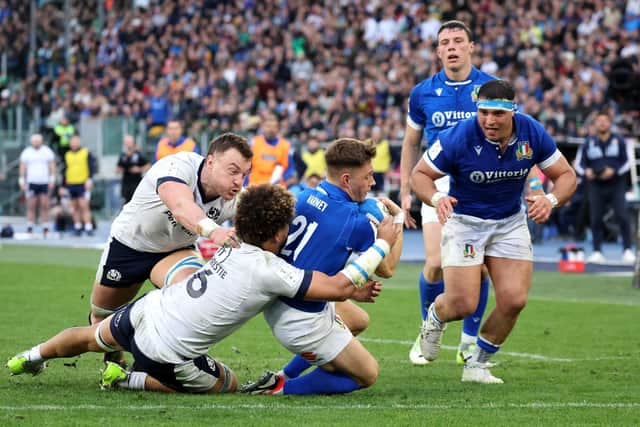Scotland's habit of letting leads slip has fatally undermined their Six Nations campaign
‘Gutted’ was a word used liberally in the bowels of the Stadio Olimpico on Saturday evening as the Scotland players and coaches tried to make sense of a seismic result that could have serious repercussions for the national side.
Gregor Townsend refused to answer a question about his future and spoke hopefully of challenging for the Triple Crown in Dublin this weekend but in the aftermath of Scotland’s first defeat in Rome for 12 years it didn’t feel appropriate.
Advertisement
Hide AdAdvertisement
Hide AdOne result shouldn’t define his reign and yet so much hinged on this match in the Italian capital. Scotland knew the likelihood was that a win would give them an outside shot at going for the title in Dublin on the final day. And they also knew that a defeat would unleash an avalanche of opprobrium.


The margins were small – the hosts won by two points – but it was the manner in which Scotland let the game slip from their grasp that was so dispiriting. They were 28-10 up after 28 minutes and playing the sort of fast, free-wheeling rugby that has been a hallmark of the Townsend era. But another recent characteristic of the coach’s tenure has been their propensity to lose momentum. We saw in Cardiff in round one how the Scots had their 27-0 lead whittled down to 27-26 during a tortuous second half. The also squandered a winning position against France and we witnessed it again on Saturday as Italy scored 21 unanswered points between the 35th and 73rd minutes to seize control.
Townsend argued that you couldn’t compare the Wales and Italy matches because Scotland wrestled back momentum in the final minutes in Cardiff and ended on the front foot, even if they didn’t get the bonus-point try they looked on course for during a rampant first half.
“We got the momentum back [in Cardiff] and dominated the last ten minutes and that’s credit to the team coming together,” said the coach. “Saturday was obviously a tougher experience because we lost. In Cardiff, the guys brought that game back to us winning it and being on their try-line at the end of the game. It would have been great to get a bonus point, but the most important thing was to win down there. We had the ball over the line against France and after we went behind against England, we were up for most of the game, certainly the second half.
“I don’t think there are parallels between Saturday and the other games. On Saturday we let slip a big advantage. We did have enough time to bring it back but the problem was giving them such a big advantage. That’s something we need to address.”


The Italy game was the 78th Test match Townsend has taken charge of since being appointed in 2017. He has won 43 of them, lost 34 and drawn one. The statistics make him the most successful Scotland coach of the professional era but they don’t tell the whole story. The high water mark of third place in the Six Nations has been achieved twice but there have also been back-to-back pool stage exits at the Rugby World Cup. He acknowledged that expectations have risen and the Scottish rugby public is now demanding more than two or three Six Nations wins per campaign. The squad is stuffed full of talent and it’s an ongoing source of frustration that it has been unable to do what Wales, Ireland, England and France have periodically done over the last quarter of a century and mount a meaningful challenge for the title.
What made Saturday’s defeat all the more startling was that Townsend had enjoyed the whip hand over Italy throughout his tenure, beating them nine times on the bounce before Saturday’s 31-29 reverse. Conversely, Ireland remain the one Six Nations rival he has yet to get the better of as head coach, losing nine in a row.
If the result against Italy felt like a shape-shifting moment, the same logic can be applied to this Saturday’s match in Dublin. If Scotland were able to win, the campaign would suddenly look very different indeed. Second place is still within Scotland’s grasp and that would be their highest finish since the tournament was expanded to include Italy in 2000. England proved at Twickenham that Andy Farrell’s side are not invincible but the fear is that Scotland will now feel the backlash as the Irish chase back-to-back titles.
Advertisement
Hide AdAdvertisement
Hide AdTownsend knows his team will have to improve almost immeasurably. Their discipline in particular will have to be on point. In the second half against Italy Scotland conceded seven penalties to Italy’s one. “We gave Italy a way into the game through penalties and field position,” said Townsend. “If you give that to any team in the Six Nations, they’re going to take the points, which they did.”


Although Scotland scored three first-half tries through Zander Fagerson, Kyle Steyn and Pierre Schoeman they were never quite able to shake off opponents who scored a try through Nacho Brex and added 11 points with the boot to cut the Scots’ lead to 22-16 at the interval. The turning point came early in the second half when George Horne’s try was disallowed after a TMO check because Schoeman had obstructed the excellent Ross Vintcent.
A couple of minutes later Paolo Garbisi played in Louis Lynagh for a debut try and Italy were suddenly within a point. Momentum had shifted and the home crowd knew it. A sold-out Stadio Olimpico was in full voice and the Italian players looked re-energised. Stephen Varney’s converted try put them ahead and, when Garbisi knocked over a 73rd-minute penalty, Scotland found themselves two scores behind. Sam Skinner reduced the arrears with a late try but time ran out for Scotland.
Townsend believes it has not run out for him. His new contract runs until April 2026 and he still has the chance to finish this campaign with a flourish but he knows Scotland should be going to Dublin with four wins under their belt. Against France they were the victims of a poor refereeing decision but in losing to Italy they only had themselves to blame.
“It’s gutting that we didn’t come away with those two wins,” said the coach. “If we get ourselves into a position to win against Ireland, the team will have played really well. That’s what we have to focus on this week.”
Comments
Want to join the conversation? Please or to comment on this article.
